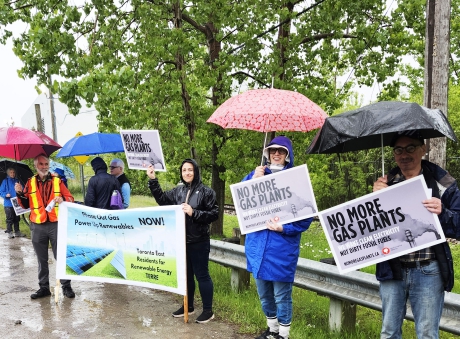Reports
You are here
Stop gas plant expansion

June 3, 2024
On May 15th a packed house attended a public forum at the Ralph Thornton Community Centre in South Riverdale on "Portlands Gas Plant Expansion – Opposing Health Risks in our Community".
Organized by a grassroots group, Toronto East Residents for Renewable Energy (TERRE), it featured local MPP Peter Tabuns and city councilor Paula Fletcher, both longtime opponents of the Portlands Energy Centre (PEC) - a methane gas fired electricity generation plant they dubbed the "mistake by the Lake" in the early 2000s.
PECs proponents argued that we shouldn't worry - it would only operate during periods of peak electricity demand - and under the McGuinty Liberal government the plant was built, despite the local opposition, and began producing electricity in 2009.
As predicted by the critics, however, once the plant existed there would be pressure to utilize the plant more and more. Last year it operated on average over 14 hours a day, and during the summer it operated close to 21 hours a day.
Health impacts
This is not only a problem due to the expansion of carbon emissions driving global heating, but is an immediate and local public health problem.
The keynote speaker at the event was Dr Mili Roy, a practicing physician who is also a member of the Canadian Association of Physicians for the Environment (CAPE) and a co-chair of the Ontario Climate Emergency Campaign (OCEC). Her presentation demonstrated the health risks from climate change and air pollutants as well as specific PEC health impacts was both informative and alarming.
Planetary heating contributes negative health impacts on populations throughout the globe, regardless of where the greenhouse gases were released. This is a global climate justice issue.
These health effects include heat related illness, asthma from wildfire smoke, flood related deaths and damage, food and water insecurity, increased severity of allergies, tick-borne disease and anxiety and PTSD following evacuation and displacement.
Climate change aggravates many human pathogenic diseases and is increasing antibiotic resistance. Depression, additions and suicide are all on the rise, particularly affecting youth.
Globally almost 7 million people die prematurely each year due to air pollution; in Canada, this amounts to over 15,000 people - almost 7,000 in Ontario. 91% of these deaths globally are in low and middle income countries, and disproportionately affects low-income and racialized communities in higher income countries.
Air pollution from burning fossil fuels includes particulate matter, ground-level ozone, nitrogen dioxide (NO2) and sulfur dioxide (SO2). These all contribute to lung disease, skin ageing, strokes and other brain disorders, heart disease, high blood pressure, insulin resistance, diabetes, blood clots and impacts on reproductive and pre-natal health. They also increase the risk of lung, leukemia, breast and other cancers. It has also been shown that viruses can hitch a ride on particulate matter, increasing infection, transmission and mortality risks.
Gas-burning plants like PEC produce NO2 directly out of the stack and contribute to increases in ground level ozone. In moist environments NO2 can form nitric acid that directly damages lung tissue. They also contribute to autoimmune and inflammatory diseases and can alter immune cell functions leading to increased infection risks. There is no safe exposure level for NO2.
PEC is the GTA’s single largest emitter of NO2, and the emissions have more than doubled over a decade, as have the greenhouse gas emissions from the plant.
In 2012 air quality models suggested NO2 from PEC was a health risk only at over 30 stories, which the plant uses to justify their increased operations.
New modeling suggests that, depending on the wind direction and speed, humidity and temperature on a given day the local, ground level NO2 levels poses a threat to community health. The exact threat level is not known, however, because there is no air quality monitoring.
But new housing developments in the port lands area will put tens of thousands of new residents directly in the path of these pollutants, even violating the 2012 guidelines.
As part of the Ford governments’ gas-fired electricity expansion, Atura Power that operates PEC is investing in new turbines that will extend its life to 2034 and likely beyond. The local campaigners in TERRE have pushed back against this plan, instead demanding a just transition to low carbon electricity generation, conservation and grid load management and many jobs ensuring that buildings are more energy efficient - ready for electric heat pumps.
On May 25th, PEC participated in Doors Open Toronto, where visitors are invited to tour building sites across the city as interesting or historic buildings. TERRE showed up at the entrance to the plant and distributed information and questions for visitors to counter the greenwashing going on inside the gates. PEC maintains a pollinator garden at the site and activities during the tour included the earth rangers childrens group while contending that burning methane is climate friendly. Look for more events this summer by TERRE to oppose the extension and expansion of this fossil gas burning plant.
Section:
Topics:










